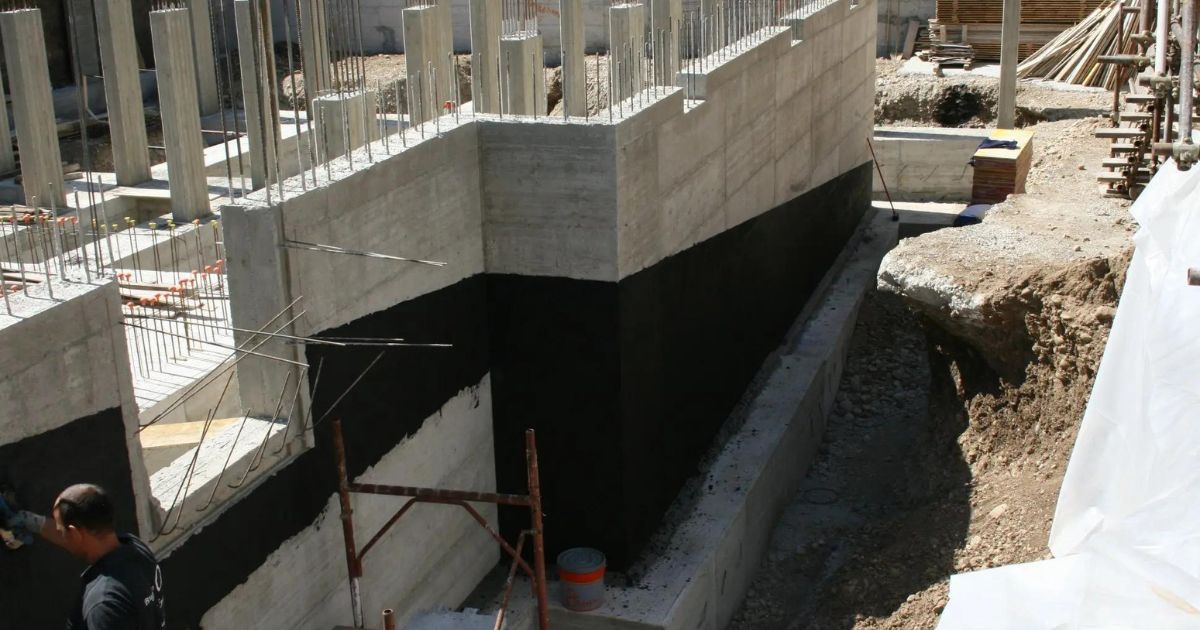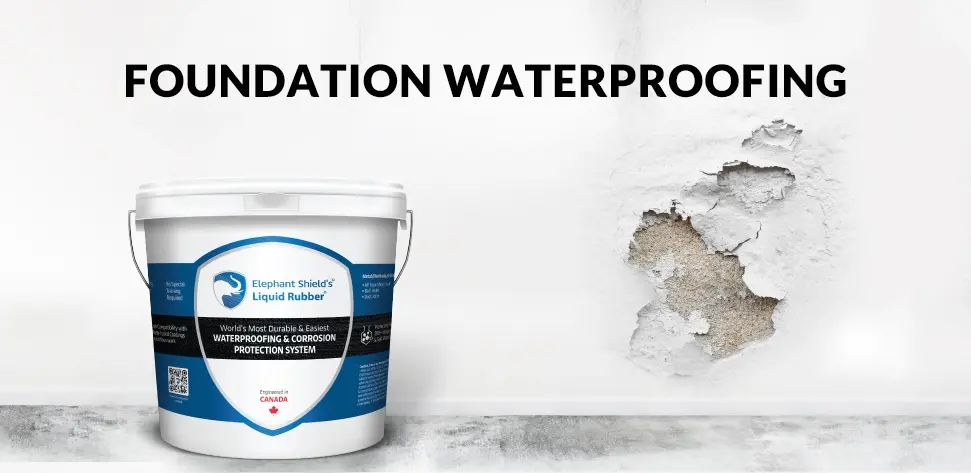When it comes to ensuring the longevity and stability of our homes, one crucial aspect that often goes unnoticed is foundation waterproofing. The foundation is, quite literally, the base upon which the entire structure rests. It plays a fundamental role in supporting the weight of the building and, therefore, must be safeguarded against environmental challenges, particularly water damage. In this comprehensive guide, we will explore what foundation waterproofing is, its various types, the benefits it offers, the methods for achieving the best results, safety considerations, and how to select the most suitable foundation waterproofing solution according to your needs.
What is Foundation Waterproofing?
Foundation waterproofing, often referred to as basement waterproofing, is the process of applying protective measures to prevent water infiltration into the foundation of a building. This essential practice helps preserve the structural integrity and ensures a dry and comfortable living environment. Concrete foundation waterproofing aims to keep moisture, water seepage, and groundwater away from the foundation, thereby mitigating the risk of structural damage and mold growth. You can use solutions like Elephant Shield Liquid Rubber for foundation waterproofing services.
Water intrusion into the foundation can result from various sources, including heavy rain, snowmelt, high groundwater levels, or even poor drainage systems. Left unaddressed, it can lead to a range of problems, including foundation cracks, basement flooding, and compromised structural stability.
Different Types of Foundation Waterproofing
There are several methods and materials used for foundation waterproofing, each suited to different situations and budgets. Here are some of the most common types:

Exterior Waterproofing:
Exterior waterproofing involves the application of waterproof membranes or coatings on the outer surface of the foundation walls. This method creates a barrier that prevents water from seeping into the foundation. It is typically done during the construction phase or as part of a foundation waterproofing walls. Foundation waterproofing treatment is a must to do for all types of buildings.
Interior Waterproofing:
Interior waterproofing, also known as interior drainage, focuses on managing water that has already penetrated the foundation. It typically involves the installation of drainage systems, sump pumps, and vapor barriers on the inside of the basement or crawl space. While it doesn't prevent water from entering the foundation, it redirects and manages it effectively.
Sealants and Coatings:
Sealants and coatings are applied directly to the foundation walls to create a waterproof barrier. These products come in various forms, such as liquid-applied coatings, sealant membranes, and waterproof paints. They are often used in combination with other waterproofing methods for added protection.
Drainage Systems:
Effective drainage plays a pivotal role in averting the accumulation of water in the vicinity of the foundation. French drains, weeping tiles, and gutter systems are commonly employed to redirect water away from the foundation and ensure it doesn't accumulate near the structure.
Foundation Crack Injections:
Water can enter a structure through foundation cracks. Injecting specialized materials into these cracks effectively seals them, preventing further water intrusion. This is also a type of foundation waterproofing treatment.
Benefits of Foundation Waterproofing
Foundation waterproofing offers a myriad of benefits, making it an essential investment for any homeowner or builder. Here are some of the key advantages:
Enhances Structural Integrity:
Water damage is one of the leading causes of foundation problems. Foundation waterproofing protects against moisture-related issues such as cracks, settling, and erosion, ensuring the long-term stability of the building.
Also, read: Waterproofing Cracks and Joints: A Guide to Keeping Your Home Dry
Mold Prevention:
A damp or wet foundation can create an ideal environment for mold growth. By keeping moisture at bay, foundation waterproofing helps prevent mold infestations, which can be harmful to both the structure and the health of occupants.
Increased Property Value:
A waterproofed foundation enhances the overall value of your property. Potential buyers are more likely to be interested in homes with a dry and well-maintained foundation, reducing the time your property spends on the market.
Energy Efficiency:
A dry basement or crawl space is easier to insulate and maintain. Foundation waterproofing can lead to energy savings by reducing the need for dehumidifiers and lowering heating and cooling costs.
Better Living Environment:
A waterproofed foundation contributes to a healthier indoor environment by reducing the risk of allergens, respiratory problems, and musty odors associated with damp basements. Basement foundation repair also improves the overall structural strength. From Basements to Roofs: Smart Waterproofing Solutions
Methods for the Best Foundation Waterproofing
Achieving effective foundation waterproofing requires careful planning and the use of appropriate methods. Here are some steps to ensure the best results:
Assess Your Needs:
Start by evaluating the specific needs and conditions of your property. Consider factors such as soil type, climate, water table levels, and existing foundation issues. This assessment will help determine the most suitable waterproofing method.
Professional Inspection:
It's advisable to seek the expertise of a professional foundation inspector or waterproofing contractor. They can identify existing problems, recommend the right waterproofing solution, and provide a cost estimate.
Proper Surface Preparation:
Before applying any waterproofing materials or coatings, ensure that the foundation surface is clean and free from debris, dirt, and contaminants. Proper preparation is crucial for the adhesion and effectiveness of waterproofing products.
Choose Quality Materials:
Select high-quality waterproofing products and materials. Consider factors such as durability, flexibility, and compatibility with your specific foundation type. Brands like Elephant Shield offer reliable waterproofing products for different applications.
Professional Installation:
For the best results, have foundation waterproofing done by experienced professionals. Proper installation ensures that the waterproofing system functions as intended and provides long-lasting protection.
Safety to Keep While Foundation Waterproofing
Foundation waterproofing, while essential, involves certain safety considerations that should not be overlooked:
Safety Gear
When working with waterproofing products and coatings, wear appropriate safety gear, including gloves, goggles, and respiratory protection. Some waterproofing materials may emit fumes or require skin protection.
Ventilation
Ensure proper ventilation in the work area to disperse fumes and prevent the buildup of potentially harmful gasses.
Follow Manufacturer Instructions
Always follow the manufacturer's guidelines and instructions for the safe use and application of waterproofing products. This includes storage, mixing, and disposal recommendations.
Professional Help
If you are not experienced in foundation waterproofing, it's safer to hire a professional contractor. They have the expertise and equipment needed to complete the job safely and effectively.
How to Select the Best Foundation Waterproofing According to Your Needs?
Choosing the right foundation application for waterproofing solutions depends on various factors unique to your property. Here's a step-by-step guide to help you make an informed decision:
Assess Your Property
Begin by assessing your property's specific conditions, including soil type, climate, water table level, and existing foundation issues. This evaluation will guide you in selecting the most appropriate waterproofing method.
Consult a Professional
Engage the services of a foundation inspector or waterproofing contractor for a thorough assessment. They can provide expert insights, recommend the best waterproofing approach, and provide cost estimates.
Consider Your Budget
Foundation waterproofing costs can vary significantly depending on the method chosen and the extent of the work required. Determine a budget that aligns with your financial capacity while ensuring that you get the necessary protection for your property.
Research Products
Research and compare waterproofing products and materials. Look for reputable brands like Elephant Shield, which offers a range of high-quality waterproofing solutions for different applications.
Seek References
Ask for references and reviews from others who have had foundation waterproofing done on their properties. Personal experiences and recommendations can provide valuable insights into the effectiveness of specific methods and contractors.
Obtain Multiple Quotes
If you decide to hire a contractor, obtain quotes from several reputable companies. Compare the quotes in terms of cost, timeline, and scope of work to make an informed decision.
Conclusion
In conclusion, foundation waterproofing is a critical aspect of maintaining the structural integrity and longevity of your home or building. By preventing water intrusion and moisture-related problems, it not only safeguards your investment but also enhances the overall comfort and health of your living space. When considering foundation waterproofing, remember to assess your property's unique needs, consult professionals, and choose high-quality products to ensure the best possible protection. Whether you're building a new structure or addressing existing foundation issues, investing in foundation waterproofing is a wise choice for the safety and well-being of your property.



